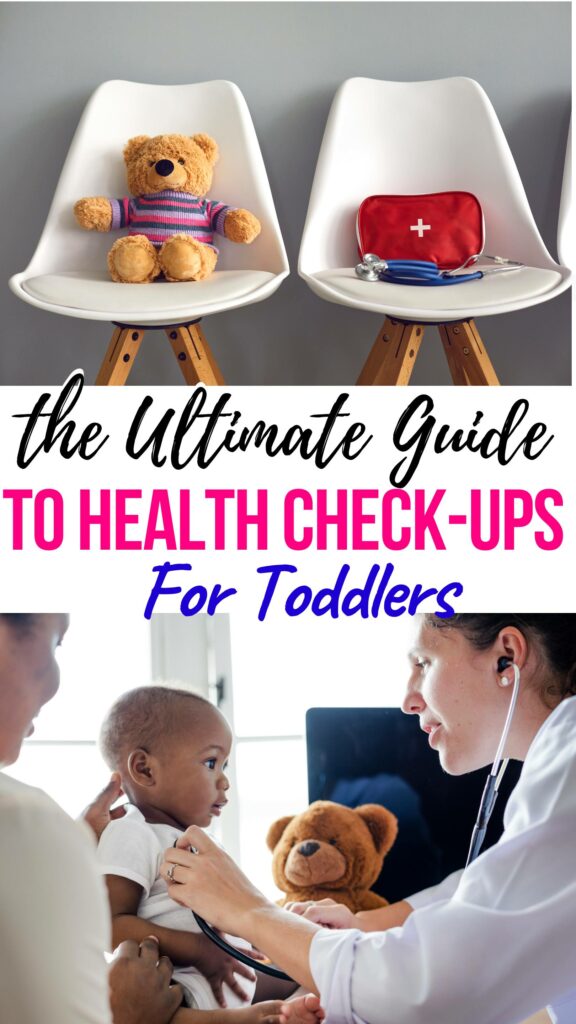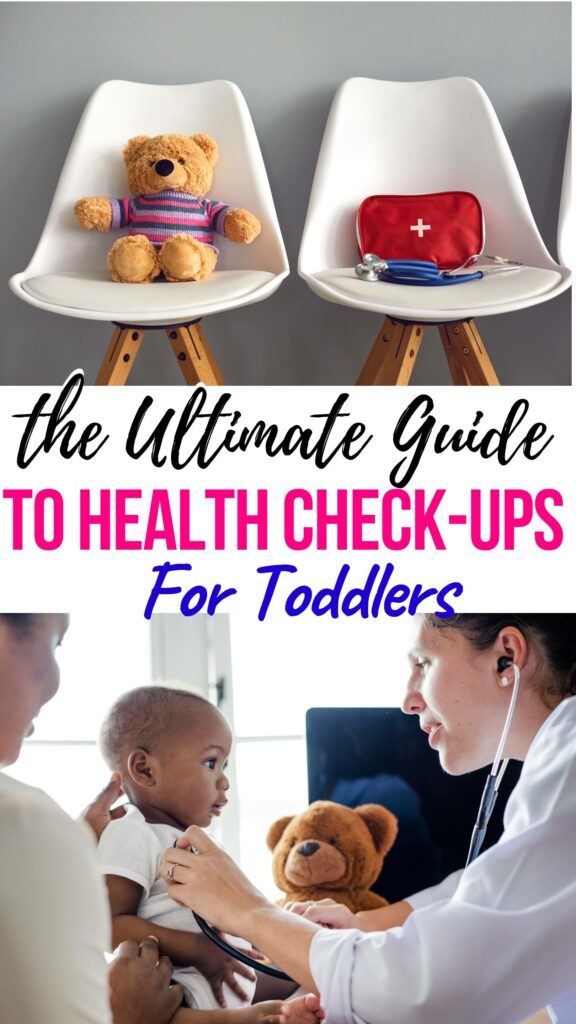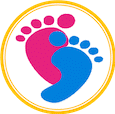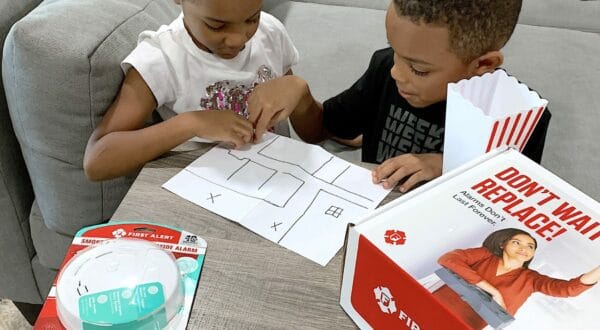
The Ultimate Guide To Routine Health Check-Ups For Toddlers
Ensuring that our toddlers receive all of their routine health check-ups can be a daunting task for any new mom. They are a cornerstone for ensuring the overall well-being of toddlers, but we don’t often get details on how, when , and where to schedule these important appointments.
In this post, I’m going to take some time to delve deeper into the components of routine toddler wellness check-ups, and hopefully empower parents to confidently engage actively in their toddler’s healthcare journey.

Overview Of Routine Health Check-Ups For Toddlers
Routine health check-ups for toddlers involve a multifaceted approach, addressing all aspects of health and development. (yes, it’s not just going to doctor’s appointments that we have to think about)
Beyond the early stages of infancy, these check-ups play a vital role in setting the stage for a lifetime of optimal health for your little one. It starts early!
Check out some of the aspects of health below that are part of the health journey for our toddlers outside of the physical wellness checkup. Keep these in mind when visiting professionals and remember to ask questions when additional topics are not mentioned!
1. Behavioral And Social Development
In a child’s first few years, social and behavioral development occurs rapidly. Routine health check-ups allow healthcare professionals to assess these aspects early, so that any concerns may be addressed
You can read more to learn about healthcare professionals and what they may look like. With health from professionals. parents can additionally receive insights into fostering positive behavior, managing challenges, and supporting healthy behavioral and social development at home.
2. Addressing Parental Concerns
Open communication is vital during routine health check-ups, allowing parents to relay their concerns or questions about their toddler’s health and development to the pediatrician.
Sometimes we may have questions that we feel we should already know or may seem silly, but this is the time to aside those notions and learn all that we can. (and don’t feel ashamed!)
Healthcare providers can offer guidance and support, ensuring that parents feel informed and confident in their role as caregivers.
3. Dental Health Assessment
Dental health is also an integral part of a toddler’s overall well-being. Routine check-ups may include a dental health assessment, where healthcare providers evaluate the toddler’s oral health, address any issues, and offer guidance on proper dental care practices.
My pediatric dentist recommended having the first appointment early as teeth are starting to come in. I took my youngest toddler at 18 months old.

The Journey From Infancy To Toddlerhood
From infancy to toddlerhood, children experience major developmental milestones and increasing independence. This period is marked by physical, cognitive, and emotional growth. Let’s explore the nuances of this transformative phase.
1. Infancy – Year 1
Monthly health check-ups for infants focus on building a solid foundation for growth and development. During these sessions, healthcare providers closely monitor the rapid changes in the infant’s body and promptly address any emerging concerns.
- Within the first week: The healthcare provider conducts a comprehensive examination to assess the baby’s overall health—including reflexes and anthropometric measurements, like weight, height, and head circumference.
- Two months: The baby receives the first set of vaccinations, and the healthcare provider monitors early developmental milestones, such as head control and visual tracking.
- Six months: An introduction to solid foods is discussed. Also, cognitive and motor skills, such as rolling over and reaching for objects, are assessed.
- Twelve months: Immunizations continue, and the healthcare provider evaluates physical and motor development, including standing, cruising, or walking.
2. One Year – Two Years
As toddlers transition from infancy, the frequency of routine health check-ups reduces to bi-monthly or quarterly. Significant milestones in communication, motor skills, social skills, and independence characterize this period.
- Fifteen months: The healthcare provider evaluates speech and language development, observing vocabulary and interaction patterns. Social skills, such as engagement with others, are also assessed.
- Eighteen months: Growth parameters are monitored to ensure steady development. Cognitive function is observed, especially problem-solving skills and exploration patterns.
- Two years: Booster vaccinations and developmental screenings are administered. The latter covers fine and gross motor skills, speech and language abilities, and social-emotional development. The healthcare provider also offers behavior-shaping and discipline strategies.
3. Two Years – Five Years
Routine health check-ups occur approximately every six months. These visits focus on physical growth, communication, and behavior.
- Two and a half years: The healthcare provider assesses cognitive skills and language development, among other growth parameters. Vision and hearing screenings may also be conducted.
- Three years: Immunizations may include boosters, and the healthcare provider evaluates speech and language skills and social interactions with peers.
- Four years: Continued monitoring of growth, vision, and hearing. The healthcare provider assesses cognitive and motor skills, addressing any concerns about school readiness.
- Five years: Comprehensive physical examination, vision and hearing screenings, and vaccinations as needed. The healthcare provider discusses school readiness, emphasizing cognitive and social skills.

Best Practices For Routine Health Check-ups
As parents actively engage in their toddler’s healthcare journey, fostering positive health experiences becomes paramount. Here are some best practices for creating a positive experience during wellness check-ups for toddlers:
- Establishing trusting relationships: Fostering a trusting relationship between toddlers and healthcare providers is crucial. Take some time to pick a pediatrician that you can really connect with and remain with for a while. (but don’t be afraid to switch if you need to :))
- Offering choices and autonomy: Providing toddlers with choices and autonomy during health check-ups, when appropriate, empowers them. Allowing them to make simple decisions enhances their sense of control and cooperation. Which color shirt between to shirts, or which snack to eat between two choices can really help.
- Incorporating play and fun elements: Integrating play and fun elements into healthcare routines can transform the experience for toddlers. Playful interactions, storytelling, or incorporating games during check-ups create a positive and enjoyable atmosphere. I love to bring dot stickers and coloring books 🙂
- Seeking professional guidance: Seeking professional guidance on age-appropriate healthcare practices and interventions ensures that parents are well-informed. Healthcare providers can offer specific strategies and techniques tailored to the toddler’s needs and temperament.
- Acknowledging progress and efforts: Acknowledging and celebrating a toddler’s progress and efforts during health check-ups reinforces positive behaviors. This positive reinforcement motivates the child to actively participate in their healthcare regimen, creating a sense of accomplishment.
- Creating a healthcare routine at home: Establishing a consistent healthcare routine at home reinforces the importance of ongoing self-care. A routine that includes regular handwashing, dental care, and other health-promoting activities contributes to overall well-being.
Navigating Toddler Health at Home
Navigating the complexities of toddler health at home requires proactive engagement, open communication, patience, and a supportive approach. This section will provide additional insights and tips for parents as they embark on this healthcare journey with their toddlers at home.
1. Recognizing Common Childhood Illnesses
Understanding common childhood illnesses equips parents to identify early signs and symptoms. This knowledge empowers them to take appropriate measures, seek timely medical attention, and comfort their toddlers during bouts of illness.
Healthcare professionals can provide parents with details regarding what to look for when it comes to fevers, colds, and other sicknesses. They can also provide guidance on when it’s appropriate to bring your child into the office with a simple call to the front desk or notes from an appointment.
2. Promoting Healthy Sleep Habits
Adequate and restful sleep is vital for a toddler’s health and well-being. Here are some ways that parents can promote healthy sleep habits:
- Bedtime routine: Setting up a bedtime routine—which may include reading bedtime stories, gentle music, or a warm bath—is a great practice. Find out what is the right routine for your child by experimenting with different activities to find your child’s sweet spot.
- Calm sleep environment: Attempt to make the bedroom a peaceful and comfortable space. Dim lights, a cool room temperature, and soft bedding can help create a calm atmosphere.
- Screen time before bed: It’s important to avoid exposures to screens at least an hour before bedtime. The blue light released from screens can disrupt the natural sleep-wake cycle.
- Regular sleep schedule: Consistency is vital. You may not always be able to stay on schedule, but creating a routine around certain times of the day, on a daily basis, has always been a game changer for me!
3. Encouraging Physical Activity
Promoting physical activity is crucial for a toddler’s development. Parents can encourage active play by providing age-appropriate outside time, activities, and toys that stimulate movement. Take a look around my site for some ideas.
Organizing outdoor play sessions to enhance coordination and motor skills, and participating in interactive activities such as dancing or playing simple sports together.
Incorporating dance or music-based activities at home can make exercise fun, while simple sports games, like kicking a ball or playing catch, promote both physical activity and social interaction.
4. Managing Nutrition Challenges
Nutrition challenges can be addressed with thoughtful strategies and advice from your pediatrician. A variety of fruits and vegetables, such as colorful berries or bite-sized broccoli, can make meals visually appealing and nutritionally diverse.
Maintaining consistent meal schedules helps establish a routine and stability, and creative presentations or themed meals make eating enjoyable.
I also like to involve my toddler in simple food preparation tasks, like stirring ingredients, toencourage and interest in diverse foods.
5. Navigating Emotional Development
Guiding toddlers through their emotional development is a crucial aspect of parenting. Parents can build a safe and supportive environment by acknowledging and validating their child’s emotions. En example would be mirroring their emotions, like sadness, and then attempting to help them solve their problem.
Implementing consistent routines provides toddlers with a sense of security, helping them regulate their emotions more effectively as well. Encouraging age-appropriate language to express feelings enables toddlers to communicate their emotions, fostering a healthy emotional vocabulary.
Modeling emotional regulation by demonstrating healthy coping mechanisms, like taking deep breaths during moments of stress, helps toddlers learn how to manage their emotions. This proactive approach to emotional development sets the stage for a positive and resilient emotional foundation as toddlers navigate the various aspects of their growing world.

In Conclusion
Routine health check-ups are the heart of establishing lifelong health for toddlers. The proactive approach to healthcare established during these formative years lays the groundwork for a future of well-being and positive health experiences.
As parents actively engage in routine health check-ups, navigate toddler health challenges, and foster positive experiences, they become key partners in their child’s journey toward optimal health. The insights in this guide aim to empower parents, offering a roadmap for navigating the intricacies of toddler healthcare with confidence and understanding.
Welcome to my blog! I am an activity mom of three and I have over 15 years of experience crafting, writing, designing and creating. My mission is to bring fun, balance and learning to your busy homes with activities, tips, inspiration, and organization!






